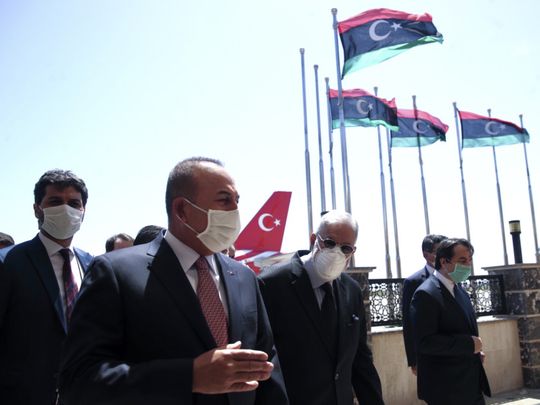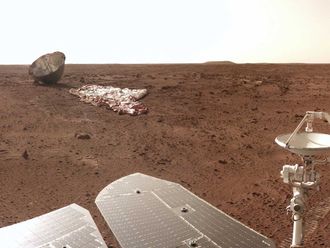
Abu Dhabi: Even those who do not agree with Egyptian President Abdul Fattah Al Sisi outside the region recognise his patience and his ability to control his temper. Three years ago, the Libyan war represented a challenge to Egypt, from which armed groups infiltrated across its western borders, from inside Libya, says Abdul Rahman Al Rashed, former general manager of Al Arabiya television and former editor of Asharq Al Awsat.
“However, Cairo chose to tackle it by tightening its border and chasing infiltrators internally. Also, for years, patience has been directed at incitements directed from Istanbul, Doha and London, carried out by the Egyptian opposition there, trying to mobilise the street, calling for violence and confrontation, using a large network of media specifically targeted against Egypt,” Al Rashed noted.
However, Cairo ignored it. Al Sisi once saved Egypt from the Muslim Brotherhood.
'Second round'
He now fears Egyptians will have to prepare for a “second round” - an allusion to a statement by the former Emir of Qatar, who commented on the exclusion of his ally, the Muslim Brotherhood from ruling in Egypt, saying, “We lost a round but there were still rounds.”
Al Rashed said, “In Libya, the adjacent country, we notice that the goals of war are changing. The fighting is no longer over the establishment of a Libyan government. Rather, the goal seems to be to make Libya the alternative country .. for the Egyptian Brotherhood group to be incubated and established.
“It appears from the signed agreements, and the Turkish military presence and its militias, that Libya will come under Turkish administration and become a home for the Egyptian opposition. That is why Ankara intervened directly not to lift the siege on the capital, Tripoli, but went to Sirte, the oil areas, and the Egyptian borders, and its language changed from supporting the Fayez Al Sarraj government as an ally to speaking on its behalf.
“We should not exclude the prospect of transforming Libya into an annex to Turkey and an alternative homeland for the Brotherhood. The Egyptian opposition is currently living in Istanbul, and has failed to penetrate Egypt, has failed to move the street against the state, and its terrorist allies have failed to create chaos and weaken the Egyptian regime.”
The Egyptian economy has witnessed a great recovery in recent years, unlike the Turkish economy, which is experiencing continuous setbacks.
Not the land of the Brotherhood
As for why Turkey wants to make Libya a Brotherhood state project, it is to compensate for their losses in Egypt and Sudan. The truth is that Libya, unlike Egypt, was not the land of the Brotherhood, except from a small group that had been active after the fall of the regime of Muammar Gaddafi, and was led by Libyans returning from Al Qaida, in addition to support from the terrorist Libyan Islamic Fighting Group and Ansar Al Sharia.
Most of the conflicting political forces in Libya have tribal and territorial differences, not religious. Moreover, most of the civil forces have evaporated since the Skhirat Agreement in 2015, which reinforced the existing fragmentation, and Libya has not recovered from it until today.
Al Rashed wrote, “Turks see in Libya oil and geography. It is a country that, when tightly controlled, is able to support the activities of Turkey, which depends for its current crisis on Doha, and a land bordering Egypt and Sudan, in which the group had deep extensions.”
He added few people know that Turkey has a military base in Mogadishu, far from its borders, and that Turkey’s largest embassy in the world is in the Somali capital, noting the only thing in common between Libya and Somalia is that they are both torn by war.
Al Rashed said, “Turkey has also had a foothold in Sudan’s Suakin Island, but its plan to build a military base there collapsed with the ouster of president Omar Al Bashir, as the new leadership in Khartoum canceled all military agreements with Ankara.
Al Rashed asked, are these Turkish red circles scattered on the map of the region the fruits of a well-planned policy, an expansionist project or just the reactions of a narcissist?
“Following the Iranian model, Turkey is using foreign militias in its war in Libya, and there are reports of its intervention in Yemen too. It has also used Syrian militias to strike the Kurds of the Syrian Democratic Forces.
These adventures and military bases do not tell us what Erdogan’s policy is, if there is one. Why? What is the expected outcome?
Blockade
Erdogan’s project calls for building a major regional power parallel to Iran, and possibly replacing it, given that the US blockade of the Iranians has already weakened them considerably. Turkey, with its 80 million people, assumes regional roles in Central Asia but has not succeeded much against Russia and Iran.
At the moment, Turkey is present in three seas: The Black Sea, the Mediterranean Sea and the Red Sea. The expected result of its political expansion and military involvement will not be the spread of the influence of the ruler of Ankara, but will rather weaken him; as he will not be able to act freely in a vast and troubled region without powerful allies.
Erdogan is still facing undecided tests, such as in the war in Syria, Russian missiles issue, and his military dispute with the Americans.








